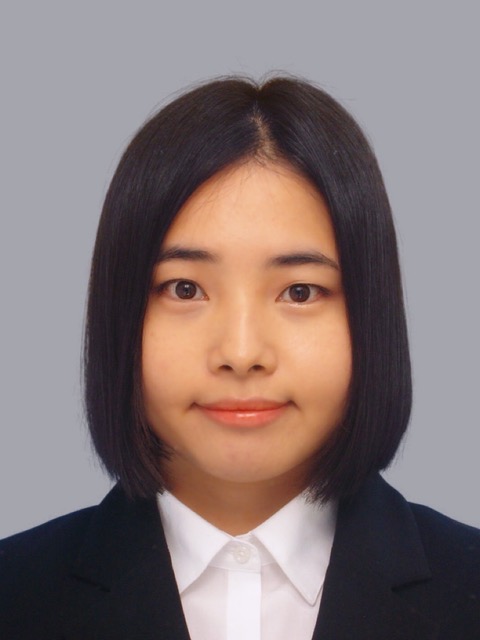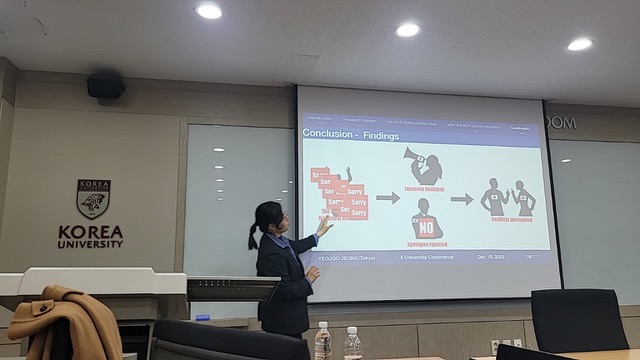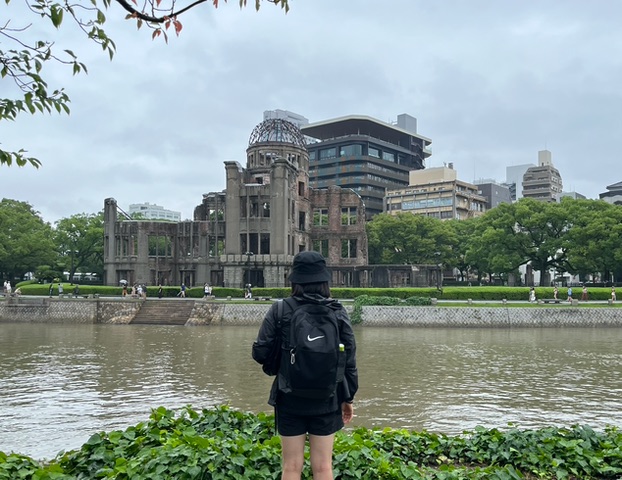Global History
Jeon, Yeojoo

University of Tokyo Full-time Lecturer
Three main achievements
東京大学の博士論文(2025年3月)
韓国の体制変化と戦後日韓歴史問題の展開
―日本の歴史関連発言をめぐる日韓交渉を中心として―
(The ROK’s Regime Change and the Developments of Postwar Japan-ROK Historical Issues: Focusing on Japan-ROK Negotiations Over Japan’s Historical Statements)
東京大学の修士論文(2021年3月)
権威主義体制の下における歴史問題の展開
―1980年代日韓交渉における歴史関連発言を中心として―
(Development of History Problem between Japan and South Korea under South Korean Authoritarian Rule: Negotiations on Japanese Official Remarks on the Past in the 1980s.)
・The negotiation process between Japan and the ROK on the Japanese history textbook issue in 1982: Focusing on The Two-Level Game Theory
Field of study
International Conflicts
Japanese Diplomacy
The kind of researcher I want to become
I aim to become a researcher who analyzes how simplified modes of thinking—those that justify exclusion and division—permeate society, and contributes to reducing their impact. Although reality is complex and multilayered, people often resort to dichotomous frameworks of “us” versus “them” when they cannot cope with such complexity. This kind of simplification leads to the dehumanization of others and legitimizes actions against them that one would not allow for oneself.
I seek to understand the structural conditions under which such thinking operates and to analyze complex realities as they are. In particular, I aim to explore how historical memory, national identity, and security discourses shape individual perceptions and judgments in East Asia. People make choices within the constraints of states and institutions, and specific political systems deeply influence individual moral reasoning. I want to move beyond a sole emphasis on individual morality to examine the conditions under which leaders and institutions committed to peace can be formed.
My goal is to strike a balance between the raw dynamics of realpolitik and the aspirations of idealism, and to cultivate practical knowledge that gives substance to the ideal of peace. Rather than remaining in the realm of wishful thinking, I intend to investigate how actual institutions and power structures function, while still seeking better possibilities within them. As E.H. Carr argued, idealism only has meaning when it endures the pressure of reality within a structural framework. Based on this equilibrium, I hope to conduct research that reduces tensions and fosters mutual understanding in East Asia.
My research is not just about accumulating results but about encouraging people to think critically. If my writings can pose meaningful questions, inspire thought, and promote reflection, that would be the most meaningful role I can play as a scholar. I want to confront broken systems without averting my eyes—quietly but clearly pointing out what is not working, while contributing to the imagination and realization of better structures.
My research theme
I focus on issues of historical memory and peacebuilding in East Asia, particularly the political and diplomatic dynamics surrounding postwar historical disputes between Japan and South Korea. Despite the end of World War, this region continues to face the unresolved challenge of fully recovering relationships affected by the past. My research examines how societies remember war, how historical memories are shaped and contested, and how they can be addressed through diplomatic interactions to enable sustainable reconciliation in East Asia.
In my doctoral dissertation at the University of Tokyo (2025), I analyzed how South Korea’s democratization influenced its historical disputes with Japan, focusing on Japanese historical statements and the evolution of bilateral negotiations surrounding them. My 2021 MA thesis investigated history-related diplomacy under South Korea’s authoritarian regime in the 1980s, while my first MA thesis at Seoul National University (2017) analyzed the 1982 history textbook controversy using Putnam’s two-level game theory.
In addition, within the broader context of peace on the Korean Peninsula, I have explored methodological approaches to understanding North Korea, which remains a state difficult to interpret in the East Asian region. For example, in 2024 I co-developed the “RADAE: Retrieval Augmented DPRK Answer Engine” with Dr. Arda Akdemir at the University of Tokyo, which was presented at the joint international conference of IPSA RC13 and RC17. This project aimed to facilitate information retrieval and analysis of DPRK texts using advanced computational methods.
Through these projects, I seek to contribute to an understanding of how painful pasts can be remembered and healed, and ultimately to build a world where such devastating wars are never repeated.
Tentative title
Research Image



